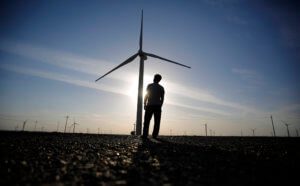
The government of Ukraine will offer Moldova to build a bridge across the Dniester in Vinnytsia region, Ukrainian Deputy Prime Minister Volodymyr Kistion wrote on Facebook on Wednesday.
“From the economic point of view, the project is advantageous not only to Ukraine and Moldova, but also to the entire European Union. Therefore the Ukrainian government is going to come up with a proposal to the Moldovan side to sign an intergovernmental agreement soon and start building the bridge,” he said.
According to Kistion, the shortest way between Kyiv and Chisinau today is the road through the city of Yampil in Vinnytsia region, which also includes a ferry service between two European countries with a length of 100 km, which has become obsolete and obsolescent long time ago.
The construction of this bridge is stipulated in the Transport Strategy of Ukraine until 2030, he added.

Norwegian-based NBT in April 2018 bought Syvashenergoprom (Kherson region, operates a wind farm with a capacity of about 3 MW) and intends to build a wind power plant with an installed capacity of 250-330 MW in the adjacent territories, the company’s website said. “In April 2018 NBT acquired the Ukrainian company Syvashenergoprom, which serves a 3 MW wind farm and is developing another 250-330 MW wind power project … NBT also signed several contracts for the development of other projects in Ukrainian wind energy, continues to seek new opportunities for the development of this market,” the report says.
As reported, in 2006 Kherson Regional State Administration transferred the unfinished Syvash wind power plant to concession to Syvashenergoprom until 2055. In 2011 Syvashenergoprom signed a lease agreement for 12 hectares of land under the concession wind farm and 1,300 hectares for the construction of new wind and solar generating facilities. NBT currently owns a 49% stake in Linxi wind farm with a capacity of 100 MW and a 33% stake in Baicheng wind farm with a capacity of 49.5 MW in China.

T.B.Fruit, one of the largest processors of fruits and berries in Ukraine, plans in 2019-2020 to start the construction of the third plant for processing apples and berries in Poland with an estimated cost of more than EUR40 million. “We plan to build the third factory in Mazowieckie Voivodeship. We are now at the stage of designing production lines. There is already a ready-made construction project, a building permit has been obtained from state authorities. The planned start of construction is 2019-2020. The third plant will have a capacity of 3,000 tonnes of apples a day with the possibility of increasing up to 4,500 tonnes, and up to 700 tonnes of berries per day,” Director for Production at T.B.Fruit Oleh Mochaliuk told Interfax-Ukraine. Investments in the specified enterprise will roughly amount to more than EUR40 million.
According to Mochaliuk, T.B.Fruit owns two plants in Poland (the first was bought in 2010, the second one in 2012) with a total processing capacity of 3,000 tonnes of apples per day. In addition to apples, strawberry, raspberry, currants, cherry, aronia, red currants, gooseberry are processed at Polish plants. He said juice production and sales in the first half of 2018 decreased by 30-40% compared to the same period in 2017 due to a poor fruit harvest.

It is planned to build a new incineration plant in Kyiv within the next two or three years, according to the information department of Kyiv City State Administration, with reference to Kyiv mayor Vitali Klitschko. “Rubbish is the problem of not only of Kyiv, it is a problem of the whole country. Now we have one incinerator plant in the capital – Energy. We need a new incineration plant. Such a plant should be built within two or three years,” Klitschko said on the air of the Snidanok z 1+1 (Breakfast with 1+1) TV program.
According to the mayor, almost 1.2 million tonnes of garbage accumulate in Kyiv every year.
He stressed that a strategic decision had already been made to abandon the practice of dumping waste and begin to process it.
“We have studied in detail the experience of other countries. The competitive commission is already working, a tender for the construction of an incineration plant has been announced,” he said.
According to the mayor, the capacity of the planned plant should be more than 420,000 tonnes of waste per year. Landfill No. 5, which will be closed in future, has approximately the same capacity.
“Soon, work will begin on the reconstruction of landfill No. 5. The dams will be strengthened, the capacity of the filtrate processing equipment will be increased. We will strengthen the landfill, install a degassing system and then close it,” Klitschko said.

Agromars Complex LLC (Kyiv region) plans to build a flotation sludge recycling plant.
“The second project being considered by Agromars Complex is construction of a flotation sludge recycling plant. Flotation sludge appears after purification of water used in slaughtering houses and extra sludge from biological treatment facilities,” the company said on its website. In particular, Agromars is interested in a project of Dutch Mavitec.
The flotation sludge recycling plant and the chicken manure recycling plant will generate electricity using a gasification method. It would be able to generate 1.1 MWh of heat and organic fertilizers.
“We have a plant producing biological additive from animal byproducts. When we build two more plants, we would complete the chain for treating any waste. This would allow solving all environmental issues as it is done in Europe,” Deputy Technical Director Oleksandr Surmach said.

MS Social Project LLC (Kyiv), part of the ICU Group, will invest in construction of the largest unsegregated solid household waste treatment plant in Zhytomyr using a custom technology, ICU reported on Thursday. “The amount of our investments in the construction of the plant will be from EUR 7 million to EUR 10 million… After the implementation of this project in Zhytomyr we are considering the possibility of building this type of plants in other cities of Ukraine,” the company said in a press release, citing the managing partner of ICU Kostiantyn Stetsenko.
According to the document, Tehnix (Croatia), which is the equipment manufacturer and developer of MBT technology (mechanical, biological and thermal treatment of solid municipal waste) was selected a contractor for the implementation of the project. Tehnix has built and commissioned more than 50 similar plants in the EU countries, in the countries where solid household waste, as well as in Ukraine, is not segregated at home.
ICU said that the design capacity of the plant involves the processing of about 82,000 tonnes of solid waste per year. The preliminary construction period of the facility is one year from the moment of obtaining the required permits. It is planned that the plant will operate in two shifts, and the number of workers will be 150 people.
The depth of treatment using this technology will reach 85-95%, and its result will be the receipt of secondary raw materials, alternative refuse-derived fuel (RDF) for cement plants and compost from the organic fraction of solid waste, ICU said.
According to Stetsenko, this innovative technology has proved its effectiveness in many countries, as well as it does not provide for emissions into the environment. It has its own sewage treatment system. He added that the company is also considering this project not only as a business, but also as an important social project.